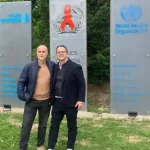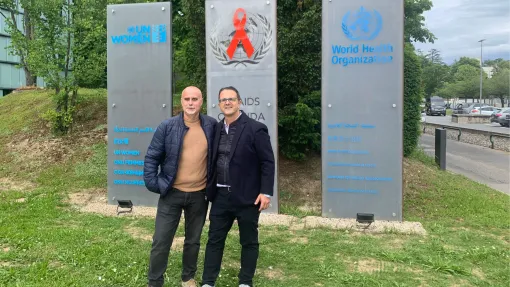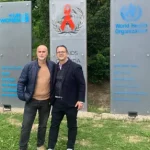

We urge the World Health Organization to promote a Resolution on Rare Diseases
Publication Date/Time:
Author: ERDF
News type: News typeInternational
Ambit: International
- He did so during the event that Rare Diseases International held in Geneva this Wednesday in parallel to the 77th World Health Assembly through Juan Carrión, president of FEDER and its Foundation, and David Sánchez, member of the Board of Directors and of the ERDF International Action Committee.
- Under the motto ‘Why invest in rare diseases? Ensuring Universal Health Coverage for people living with rare diseases’, FEDER has been able to transfer its experience as a national organization, contributing to collaboration between countries and reflecting on the value of a WHO Resolution.
- Because although there are already precedents such as the UN Resolution on rare diseases since 2021, it is necessary to “homogenize access to available resources and coordinate existing initiatives and put them at the service of patients and other territories,” they have transferred from FEDER. .
- Especially because “this will not only generate an impact in Europe, but also in other places in the world such as Latin America” where countries are still identified that: do not have a clear definition of what a rare disease is, there are no records or plans , as stated by Juan Carrión, also as president of ALIBER.
Press release | The Spanish Federation of Rare Diseases (FEDER) has urged the World Health Organization (WHO) to promote a Resolution on these pathologies next year that stops the inequity in access to the resources available for these pathologies and contributes to the achievement of Universal Health Coverage.
He did so during the event that Rare Diseases International (International Network for Rare Diseases) held in Geneva this Wednesday in parallel to the 77th World Health Assembly in collaboration with France and Malaysia. Juan Carrión, president of FEDER and its Foundation, and David Sánchez, member of the Board of Directors and of the FEDER International Action Committee, have traveled there.
Under the motto ‘Why invest in rare diseases? Ensuring Universal Health Coverage for people living with rare diseases, FEDER has been able to transfer its experience as a national organization, contributing to collaboration between countries, promoting work between associations and governments and the value that having a Resolution would mean. of the World Health Organization.
He has reflected on this in this meeting that has involved more than 15 experts in the debate, including Ministers of Health, representatives of the WHO and representatives of patients from around the world, including, in addition to the collaborating countries, Egypt, Brazil. o Zimbabwe to reflect on how to integrate rare diseases into the Global Health Goals 2035, aligning with the World Health Programme.
«Patients generate knowledge where it does not exist and lead social transformation»
Under this prism, Juan Carrión has explained how from these patient associations “we work at all levels because in rare diseases we know that no country or organization alone can face the challenges they pose. As? Generating knowledge where it does not exist, for example, with the ENSERio LATAM study that for the first time gave us data on the common challenges of Latin America.
Along with this, the President of FEDER, who has also participated as president of the Ibero-American Alliance for Rare Diseases (ALIBER), has stated that patients also “lead the social transformation that promotes global frameworks such as the UN Resolution on RD, initiatives to improve care and share information between countries such as the European Reference Networks or national plans such as the SNS ER Strategy that Spain has just evaluated and on which we are working to ensure continuity.
To achieve this, FEDER has been working for more than 25 years alongside alliances such as EURORDIS, the European Alliance for Rare Diseases, to integrate rare diseases into public policies. Advances that FEDER and Spain are working to land in more difficult realities, such as Ibero-American countries, where countries are still identified that: do not have a clear definition of what a rare disease is, there are no records, no plans, no frameworks that regulate resources in a homogeneous way.
Impact of a World Health Assembly Resolution on rare diseases
The UN Resolution paves the way for greater incorporation of rare diseases among United Nations priorities. However, a framework for coordinated action with all stakeholders and Member States is needed to translate these commitments into action and overcome barriers to accessing diagnosis, treatment and care for people living with rare diseases to ensure so that no one is left behind in the pursuit of universal health coverage.
And the fact is that, “despite the progress identified, we need to homogenize access to available resources and coordinate existing initiatives and put them at the service of patients and other territories,” FEDER stated. A World Health Assembly Resolution would be a fundamental tool to achieve this.
Above all because “this will not only generate an impact in Europe, but also in other places in the world such as Latin America, where there is still a great lack of equity in access to available resources,” said the president of FEDER.
Spain’s role before the UN and the WHO
This event gives continuity to the actions that FEDER and the international associative network have been developing for years to motivate a global framework of action that guarantees equity in access to the resources available for rare diseases. An action that, as the main precedents, made possible the incorporation of rare diseases within the Declaration of Universal Health Coverage of 2019 and, later and as the main milestone, the UN Resolution of 2021.
A resolution that has marked a before and after and on which this event has pivoted, which seeks to give continuity to guarantee Universal Health Coverage and which was updated last 2023, incorporating, among others, the group of people without a diagnosis for the first time. , thanks to the work of FEDER through RDI.
The involvement of our organization and, consequently, of our country has always been key in this sense. Spain was, precisely, one of the countries that already led the approval of the UN Resolution on Rare Diseases in 2021 along with Brazil and Qatar, which is why the leadership and broad representation of our country in this space is especially significant. sought to advance Universal Health Coverage for people with rare diseases through specific actions such as a Resolution of the World Health Organization.
Published on 05/21/2024.
Updated on 05/30/2024.
Share on:
